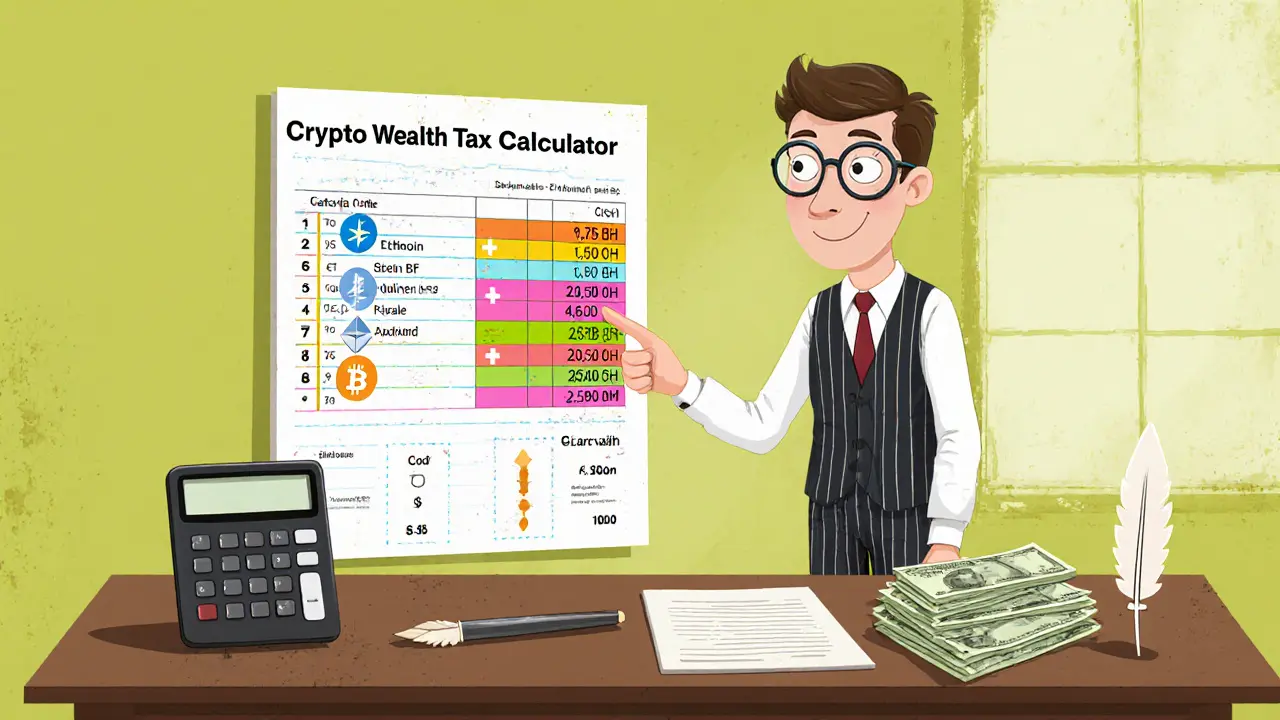Swiss Crypto Wealth Tax Calculator
Estimated Taxable Crypto Value
If you own Bitcoin, Ethereum or any other digital token and you’re a resident of Switzerland is a federal state known for its stable tax environment and cantonal autonomy, you need to know exactly how the wealth tax treats those assets. The good news is that Switzerland classifies crypto as a private‑wealth asset, not as ordinary currency, which means you only report its market value each year - there’s no ordinary income tax on private gains. The bad news? Each of the 26 cantons applies its own rate, and you must use the official year‑end conversion rates or, for obscure coins, the price on the exchange you used.
Legal Foundations: How Swiss Law Defines Crypto
In August2021 the DLT Act came into force to give legal certainty to distributed‑ledger technologies. The Act works hand‑in‑hand with guidance from the Federal Tax Administration (FTA) the federal body that issues tax rulings and conversion tables. The FTA’s working papers (2019and updated 2021) label crypto assets as “kryptobasierte vermögenswerte”, i.e., crypto‑based wealth assets, and treat them like stocks or bonds for wealth‑tax purposes.
What You Must Declare: Year‑End Wealth Assessment
Every December31 you have to include the CHF value of all crypto holdings in your total wealth statement. The FTA publishes official rates for the major coins - Bitcoin, Ethereum, Ripple, Bitcoin Cash and Litecoin - usually on the last day of the year. For those, simply multiply the amount you own by the official rate. If your coin isn’t on the list, you must take the closing price on the exchange you used most often. When no reliable market price exists, you fall back to the original purchase price recorded in CHF.
Example: you hold 0.75BTC, 10ETH and 2,500XLM (Stellar). The FTA’s 2025 year‑end rates are CHF30,800 for 1BTC and CHF1,950 for 1ETH. Your declared value would be:
- 0.75×30,800=CHF23,100
- 10×1,950=CHF19,500
- 2,500×price on your primary exchange (e.g., CHF0.10)=CHF250
Total crypto wealth = CHF42,850, which is added to your bank accounts, real estate, etc., for the cantonal wealth‑tax calculation.
Cantonal Rate Landscape
Switzerland’s 26 cantons set their own wealth‑tax brackets. Most charge between 0.3% and 1% of net wealth, but the exact percentage depends on your total assets and sometimes on marital status. Here’s a quick snapshot of typical rates for 2025:
| Canton | Rate on Net Wealth | Threshold for Tax‑Free Allowance |
|---|---|---|
| Zürich | 0.15% - 0.5% | CHF77,000 (single) |
| Geneva | 0.3% - 1% | CHF100,000 (single) |
| Vaud | 0.2% - 0.8% | CHF50,000 (single) |
| Bern | 0.15% - 0.6% | CHF75,000 (single) |
| Schwyz | 0.1% - 0.5% | CHF120,000 (single) |
Because wealth tax is calculated after deducting cantonal allowances, many investors move to low‑rate cantons (e.g., Schwyz or Zug) to keep the overall burden under 0.4%.
Capital Gains: Private vs. Professional
Switzerland’s biggest draw for crypto holders is the complete exemption from capital‑gains tax (CGT) for private investors. Whether you double your Bitcoin value in a week or hold it for ten years, the profit is tax‑free as long as you’re classified as a private “wealth‑asset” holder.
However, the FTA circular36 draws a line: if you trade frequently, use leveraged positions, or run a business that buys and sells crypto, you are deemed a professional securities trader. In that case, gains are added to ordinary income and taxed at the combined federal‑cantonal‑municipal rates (roughly 20%-45% depending on canton and income level). The distinction hinges on three criteria:
- Trading frequency (more than 10 transactions per year is a red flag)
- Holding period (average < 6 months suggests professional activity)
- Use of borrowed capital or systematic profit‑making strategies
If you fall into the professional bucket, you also must pay payroll‑style social security contributions on the net earnings.

Token Classification and Its Tax Impact
Not every coin is treated the same. The Swiss Financial Market Supervisory Authority (FINMA regulates securities, banking and insurance, and also issues token classifications) distinguishes three main categories:
| Token Type | Wealth‑Tax Inclusion | Capital‑Gains Tax | Typical Use Case |
|---|---|---|---|
| Payment Token (e.g., Bitcoin, Litecoin) | Yes - valued at market price | Exempt for private holders | Medium of exchange |
| Utility Token (e.g., Filecoin, Golem) | Yes - valued at market price | Exempt unless used for business services | Access to a platform or service |
| Security Token (e.g., tokenized shares) | Yes - treated like shares | Exempt for private holders; taxable if classified as business asset | Represents ownership in an underlying asset |
In practice, most private investors hold payment tokens, so the default regime (wealth‑tax inclusion, CGT exemption) applies.
Practical Tips for Accurate Reporting
- Keep a single spreadsheet that logs every purchase, sale, and transfer, including the CHF value on the transaction date.
- Use the FTA’s official year‑end rates for Bitcoin and Ethereum; for altcoins, export the closing price from the exchange’s API on31December.
- If you mine or stake, treat the harvested coins as business income (taxed as ordinary earnings) and also include the remaining balance in the wealth‑tax calculation.
- Consider family‑wealth structures: spouses can split crypto holdings to stay under each individual’s wealth‑tax allowance.
- When moving between cantons, request a pre‑tax assessment to gauge the impact before finalizing your new domicile.
Common Pitfalls and How to Avoid Them
Pitfall1: Ignoring lesser‑known tokens. If a coin isn’t covered by the FTA table, you must pull the price from the exchange you used most often. Failure to do so can trigger a tax audit.
Pitfall2: Misclassifying a professional trader as a private investor. The tax authority audits trading patterns regularly. Keep evidence of any “hobby”‑level activity (e.g., occasional purchases) versus systematic trading.
Pitfall3: Forgetting to report staking rewards. Staking is considered income when earned; you must declare the CHF value at the time of receipt, then add the remaining tokens to your wealth‑tax sheet.
Future Outlook
As of October2025, no major changes to the wealth‑tax framework are expected. The Federal Tax Administration continues to update its December guidance, most recently in December2024, which clarified that DeFi yield farming is taxed either as income (if the protocol provides a clear service) or as wealth appreciation (if the tokens merely sit in a wallet). The stability of the regime is one reason why the Swiss Blockchain Federation reports a steady influx of crypto startups seeking a predictable tax climate.
Quick Reference Checklist
- Declare the CHF market value of every crypto asset on 31December.
- Use FTA official rates for Bitcoin, Ethereum, Ripple, Bitcoin Cash, Litecoin.
- For other tokens, pull the price from your main exchange on the same date.
- Private holders enjoy 0% capital‑gains tax; only business income is taxable.
- Check your canton’s wealth‑tax rate - low‑rate cantons can cut the bill by up to 50%.
- Maintain detailed transaction records to prove private‑investor status.

Frequently Asked Questions
Do I pay any tax on Bitcoin gains if I’m a private investor?
No. Private investors in Switzerland are exempt from capital‑gains tax on Bitcoin or any other payment token, regardless of profit size or holding period.
How do I value a rare altcoin that isn’t on the FTA list?
Use the closing price from the exchange where you most frequently trade that coin on 31December. If no reliable price exists, you may revert to the original purchase price in CHF.
Are staking rewards taxed as income?
Yes. When you receive staking rewards, the CHF value at receipt is treated as ordinary income and taxed at your marginal rate. The remaining tokens still count toward wealth tax.
What defines a professional crypto trader?
The FTA looks at trading frequency, average holding period, and use of leverage. Exceeding roughly 10 trades a year, holding assets under six months on average, or using borrowed funds signals professional activity, triggering income tax on gains.
Can I lower my wealth‑tax bill by moving to another canton?
Yes. Cantonal rates vary from 0.1% to 1%. Relocating to a low‑rate canton like Schwyz or Zug can reduce the effective tax on your crypto holdings by several percentage points.
Understanding the cryptocurrency wealth tax Switzerland landscape helps you keep more of your digital assets while staying fully compliant. Stay on top of year‑end rates, track every transaction, and choose your canton wisely - that’s the recipe for a tax‑efficient crypto portfolio in 2025.


Eugene Myazin
May 12, 2025 AT 23:04Nice breakdown! The Swiss wealth‑tax landscape can feel like a maze, but this guide makes it way more approachable. Keep it up!
karyn brown
May 19, 2025 AT 21:44Wow, this is *so* helpful 😍! I love how you spelled out the cantonal differences, especially the low‑rate spots like Zug 😎. Just a heads‑up, watch out for those typo‑prone tables 🔧.
Nilesh Parghi
May 26, 2025 AT 20:24Reading this feels like strolling through a quiet garden of tax rules. The distinction between private and professional trading is the real philosophical fork in the road. If you treat crypto as a hobby, the tax gods smile; if you trade like a market‑maker, they frown.
karsten wall
June 2, 2025 AT 19:04From a compliance standpoint, the FTA's official rates act as the baseline metric for wealth‑tax calculations. In practice, you’ll want to harmonise your ledger entries with the canton‑specific allowances to optimise net exposure. Think of it as a calibrated risk‑adjusted portfolio for tax efficiency.
Lana Idalia
June 9, 2025 AT 17:44Let’s unpack this masterpiece of fiscal engineering, layer by layer. First, the Swiss classification of crypto as "kryptobasierte vermögenswerte" effectively places digital assets in the same tax bucket as equities, which is a profound acknowledgment of their economic substance. Second, the annual wealth‑tax report hinges on the year‑end conversion rates published by the Federal Tax Administration, a procedural anchor that eliminates arbitrary valuation. Third, cantonal autonomy injects a strategic variable; moving from a high‑rate canton like Geneva (up to 1%) to a low‑rate canton such as Schwyz (0.1‑0.5%) can slash your liability by a half, a move that’s both legally sound and financially savvy.
Fourth, the privacy‑preserving nature of blockchain data means you must maintain meticulous off‑chain records-spreadsheets, CSV exports, API pulls-to substantiate the declared CHF values. Fifth, the distinction between private and professional trading is not just academic; the FTA's three‑criterion test (frequency, holding period, leverage) can reclassify gains from tax‑free to fully taxable income, altering your marginal tax bracket dramatically.
Sixth, the treatment of staking rewards as ordinary income at receipt, followed by their inclusion in the wealth‑tax base, creates a two‑pronged tax event that many overlook. Seventh, token classification by FINMA-payment, utility, security-determines whether your holdings enjoy the default wealth‑tax inclusion or face additional securities‑law implications.
Eighth, the Swiss system’s neutrality toward crypto capital gains for private investors is a unique competitive advantage that fuels the country’s burgeoning blockchain ecosystem. Ninth, family‑wealth structures, such as splitting holdings between spouses, can keep each partner beneath the cantonal allowance threshold, effectively doubling the tax‑free space.
Tenth, the upcoming regulatory updates-particularly the 2025 DeFi guidance-signal that yield‑farming returns may be taxed as either income or capital appreciation depending on the service nature, adding a nuanced layer of compliance.
Eleventh, the practical tip to pull altcoin prices from your primary exchange on 31 December ensures consistency with the FTA’s expectation of market‑based valuations.
Twelfth, the recommendation to request a pre‑tax assessment before relocating safeguards against unexpected surcharges.
Thirteenth, the FAQ section succinctly clarifies common doubts, but remember that each canton may have its own interpretation nuances, so a local tax advisor is priceless.
Fourteenth, the wealth‑tax calculator embedded in the article serves as a quick sanity check but should never replace professional counsel for complex portfolios.
Fifteenth, the overall message is clear: stay organized, respect cantonal differences, and leverage Switzerland’s favorable regime to maximise net crypto returns. In short, knowledge is the ultimate tax‑saving tool.
Henry Mitchell IV
June 16, 2025 AT 16:24👍 Great insights! Thanks for the clarity.
Kamva Ndamase
June 23, 2025 AT 15:04Wow, moving to Zug sounds like a power‑move! If you’re serious about cutting wealth‑tax, you should also consider setting up a family holding company to pool assets and amplify the tax shield. Just don’t forget the administrative overhead.
bhavin thakkar
June 30, 2025 AT 13:44Honestly, the only thing missing is a quick cheat‑sheet for the top three cantons. Everyone loves a good table.
WILMAR MURIEL
July 7, 2025 AT 12:24I really appreciate how thorough this guide is. It’s not often you find a resource that explains both the legal definitions and the practical steps side by side. The part about staking rewards being taxed as ordinary income can catch many people off guard, especially those who think of staking as a passive activity. Your suggestion to keep a single spreadsheet for all transactions is spot‑on; I’ve seen too many people juggle multiple sheets and end up missing crucial entries. Also, the tip about pulling alt‑coin prices from your primary exchange on December 31st helps keep the valuation consistent with FTA expectations. It’s those tiny details that make the difference between a clean filing and a tax audit trigger. Thanks for laying it all out so clearly.
carol williams
July 14, 2025 AT 11:04While your guide is comprehensive, I must point out that the discussion on professional trader classification could be expanded. The FTA’s thresholds are somewhat flexible, and relying solely on a “10 trades per year” rule might be oversimplified. Including examples of borderline cases would enhance clarity.
jit salcedo
July 21, 2025 AT 09:44Interesting read, but have you considered how the hidden agendas of the tax authorities could influence the reporting requirements? Some say the FTA is experimenting with blockchain‑based audits-something to keep an eye on.
Ally Woods
July 28, 2025 AT 08:24Nice summary, though a bit dense for newcomers.
Kristen Rws
August 4, 2025 AT 07:04Great job! This really clears up a lot of confusion for folks just getting into crypto in Switzerland.
Fionnbharr Davies
August 11, 2025 AT 05:44Indeed, the emphasis on record‑keeping cannot be overstated. A well‑organized ledger not only simplifies tax reporting but also provides peace of mind during audits.
Narender Kumar
August 18, 2025 AT 04:24In conclusion, the Swiss crypto tax framework, while nuanced, offers a uniquely favorable environment for long‑term investors, provided they adhere to cantonal regulations and maintain meticulous documentation.